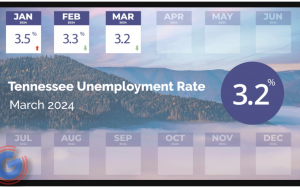The Tennessee gas price average continues to decline and has dropped nearly 13 cents since this time last week. The Tennessee Gas Price average is now $1.77 which is 45 cents less than one month ago and nearly 71 cents less than one year ago.
• Most expensive metro markets - Nashville ($1.90), Morristown ($1.86), Kingsport ($1.86)
• Least expensive metro markets - Cleveland ($1.59), Memphis ($1.62), Chattanooga ($1.70)
"Tennessee motorists are seeing dramatic declines in pump prices. The state average is down 45 cents since March 1," said Megan Cooper, spokesperson, AAA - The Auto Club Group. "More discounts are expected in the coming week as gasoline demand continues to decline."
Quick Facts
94% of TN filling stations have sub-$2 gas prices
TN gas prices have declined for 33 consecutive days for a total discount of nearly 47 cents per gallon
Eight metro areas have seen double-digit decreases at the pump in the last week
All metro areas have average prices below $2 per gallon
National Gas Prices
At $2.01, the national gas price average is 11-cents cheaper on the week, 43-cents less expensive on the month and 68-cents less than a year ago.
Crude oil continues to price low - in the $20/bbl range - as U.S. gasoline demand decreases to numbers typically seen during the winter driving season. In fact, there is an atypical amount of winter-blend gasoline supply still available, which has caused the Environmental Protection Agency to extend the sale of winter blend past the May 1 deadline to May 20. The agency said they will continue to monitor and, if necessary, extend the waiver again.
"Delaying the switch-over to summer-blend gasoline will contribute to sustained lower prices as summer-blend is more expensive to produce," added Cooper.
The difference between summer- and winter-blend gasolines is how easily the fuel evaporates at a given temperature. The more volatile a gasoline, the easier it evaporates. Winter-blend fuel must be able to evaporate at low temperatures for the engine to operate properly, especially when the engine is cold. Summer-blend gasoline has a lower volatility to prevent excessive evaporation when outside temperatures rise. Reducing the volatility of summer gas decreases emissions that can contribute to unhealthy ozone and smog levels.












